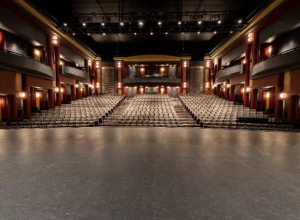For those who are looking for the perfect solution to update their theatre or auditorium flooring, there is no shortage of options on the market today. From luxurious carpets to timeless tile and marble designs, there’s something here for everyone.
Whether you’re aiming to add a touch of style and sophistication or need an upgrade fr
om your existing bare flooring, understanding all the best ways to select beautiful floor coverings can
be overwhelming. That’s why we’ve gone ahead and put together this comprehensive guide on theatre & auditorium flooring so that you can make an informed decision about which type will work best in your space.
Benefits of having theatre and auditorium flooring
When it comes to designing a theatre or auditorium, flooring is an important element that should not be overlooked. While many may think of it as just a decorative aspect, the type of flooring used can have significant impacts on the overall experience of both performers and audiences.
Here are some benefits of having proper theatre and auditorium flooring:
Enhances sound quality
In a theatre or auditorium, sound quality is crucial. The right type of flooring can absorb excess noise and vibrations, creating a better acoustic environment for performances.
Increases safety
With large crowds and heavy equipment being moved around, safety is always a top concern in theatres and auditoriums. High-quality flooring can provide durability and slip resistance to prevent accidents.
Improves visibility
The type of flooring used can also affect the visibility of the performance. For example, dark-coloured floors can absorb light and make it harder for audiences to see, while light-coloured floors can reflect light and improve visibility.
Adds aesthetic appeal
As mentioned before, flooring is not just a functional aspect but also adds to the overall aesthetics of the space. With different materials, patterns, and designs available, the right flooring can complement the theme and atmosphere of the theatre or auditorium.
Reduces maintenance costs
Properly installed and maintained flooring can last for many years. This means less frequent repairs and replacements, saving on long-term maintenance costs.
Types of flooring commonly used in theatres and auditoriums
When choosing the right type of flooring for a theatre or auditorium, several factors must be considered, such as durability, maintenance, and budget. Here are some common types of flooring used in these spaces:
Epoxy Resin Flooring
Epoxy resin flooring is an increasingly popular choice for theatres and auditoriums due to its blend of practicality and aesthetic appeal. Characterised by a smooth, seamless surface, epoxy resin floors are both durable and easy to maintain, making them an ideal choice for high-traffic areas.
One of the key advantages of epoxy resin flooring lies in its resistance to wear and tear. These floors are designed to withstand heavy foot traffic, spills, and even the weight of stage equipment, ensuring they remain in excellent condition for a long period.
Another benefit of epoxy resin flooring is its versatility in design. Available in a variety of colours and patterns, it allows for a high degree of customization. This means that it can be tailored to match the design aesthetic of any theatre or auditorium.
Moreover, epoxy resin floors are valued for their low maintenance needs. They are easy to clean and do not require frequent refinishing, which can reduce long-term maintenance costs. From a safety perspective, epoxy resin flooring is a commendable choice. The surface is slip-resistant, ensuring the safety of performers and crew members alike.
Decorative Resin Flooring
Decorative resin flooring is another excellent option for theatres and auditoriums, offering a combination of aesthetic appeal, durability, and practical functionality. With a multitude of colours and patterns to choose from, decorative resin flooring opens up a world of design possibilities, enabling the creation of truly unique and visually captivating interiors.
One of the main strengths of decorative resin flooring is its ability to withstand heavy footfall and substantial load, making it a highly durable choice for busy venues. The seamless nature of the flooring also makes it inherently hygienic, as there are no joints or seams where dirt can accumulate.
From a maintenance point of view, decorative resin flooring is a cost-effective solution. Easy to clean and resistant to most common forms of wear and tear, it demands minimal maintenance, thereby reducing long-term costs.
Another significant advantage of this flooring type is its safety features. Known for its anti-slip properties, decorative resin flooring helps ensure the safety of performers, staff, and visitors within the theatre or auditorium.
PU Resin Flooring
PU (Polyurethane) Resin Flooring is a top choice for theatres and auditoriums seeking an effective balance of durability, versatility, and visual appeal. Renowned for its robust nature, PU resin flooring can withstand heavy foot traffic, frequent shifts in stage setup, and the burdens of large-scale events, making it an ideal solution for such high-demand environments.
One of the standout features of PU resin flooring is its elasticity, which contributes to its long life and resistance to wear and tear. This characteristic also makes it an excellent choice for absorbing sound and reducing echo, paramount in a theatre or auditorium setting where acoustics are vital.
In terms of aesthetics, PU resin flooring offers a high degree of flexibility. Available in a broad array of colours and can be tailored to fit any design scheme, it can seamlessly blend with the overall visual theme of the theatre or auditorium.
Maintenance-wise, PU resin flooring requires minimal upkeep. Its smooth, seamless surface is easy to clean and more resistant to spills and stains than traditional flooring options. This not only simplifies the cleaning process but also reduces maintenance costs over the long term.
From a safety standpoint, PU resin flooring is slip-resistant, ensuring the safety of performers and patrons alike. Its shock-absorbing properties also make it a safer option in the unlikely event of a fall.
Important considerations when choosing theatre and auditorium flooring
When selecting the appropriate flooring for a theatre or auditorium, here are some important factors to keep in mind.
Durability: With large crowds and heavy equipment constantly moving around, the flooring must be able to withstand wear and tear. Consider materials that are sturdy and have a long lifespan.
Maintenance: Regular maintenance is necessary for any type of flooring, but some require more upkeep than others. Consider the time and resources needed to keep the flooring in good condition.
Safety: The safety of performers and audiences should always be a top priority. Look for slip-resistant flooring options, especially in high traffic areas.
Budget: It’s important to consider the cost of both installation and long-term maintenance when choosing flooring for theatres and auditoriums. Make sure to find a balance between quality and affordability.
Tips for maintaining theatre and auditorium flooring
Proper maintenance is crucial for preserving the beauty and functionality of theatre and auditorium flooring. Here are a few tips to help you keep your chosen flooring in top condition:
Regular cleaning: Depending on the type of flooring, regular vacuuming, mopping or sweeping may be necessary to remove dirt and debris.
Spill management: Accidents happen, especially in high traffic areas like theatres and auditoriums. It’s important to have a plan in place for quickly cleaning up spills to prevent damage or staining.
Repair any damages: Keep an eye out for any damages to the flooring and address them promptly. This will not only maintain its appearance but also prevent further damage.
Schedule professional maintenance: Some types of flooring may require professional maintenance, such as replacing or refinishing. Be sure to schedule these services regularly.
Conclusion
Selecting the right flooring for theatres and auditoriums is a pivotal decision that goes beyond aesthetics. The ideal flooring should seamlessly blend durability, acoustics, and comfort to enhance the overall experience for both performers and the audience. Whether it’s a resilient option for high-traffic areas or specialised flooring for optimal sound absorption, the choice contributes significantly to the functionality and ambiance of the space. Ultimately, investing in quality flooring for theatres and auditoriums is an investment in creating a conducive environment for performances, events, and gatherings, ensuring a lasting impact on both performers and spectators alike.
FAQ’s
What is the best type of flooring for a theatre or auditorium?
The ideal type of flooring for a theatre or auditorium depends on several factors such as budget, usage, and aesthetic preferences. Some popular options include carpet, hardwood, vinyl, and rubber flooring. Each material has its own benefits and drawbacks, so it is important to carefully consider your specific needs before making a decision.
How do I choose the right flooring material for my theatre or auditorium?
When choosing the right flooring material for your theatre or auditorium, there are a few key factors to keep in mind. Some flooring options require more maintenance than others, so factor in the time and cost for upkeep. The flooring should also complement the overall design and decor of your theatre or auditorium. Based on these factors, you can narrow down your options and choose the best material for your specific needs.
Are there any specific requirements for theatre and auditorium flooring?
Yes, there are certain requirements that need to be considered when installing flooring in a theatre or auditorium. These may include fire safety regulations, slip resistance, and ADA accessibility guidelines. It is important to consult with a professional or do thorough research to ensure your flooring meets all necessary requirements.
Can I use carpet as a flooring option for my theatre or auditorium?
Yes, carpet is a popular choice for theatre and auditorium flooring due to its sound absorption properties and added comfort for viewers. However, it is important to choose a carpet with a low pile and dense construction to best withstand heavy foot traffic.
What is the maintenance cost for theatre and auditorium flooring?
The maintenance cost for theatre and auditorium flooring depends on the type of material used. Some materials may require more frequent cleaning or replacement due to wear and tear, which can add to the overall maintenance cost. It is important to factor in these costs when selecting a flooring material.
Can I install my own flooring or do I need to hire a professional?
While some flooring materials may be easier to install on your own, it is generally recommended to hire a professional for theatre and auditorium flooring installation. This ensures that the job is done correctly and meets all necessary regulations. Additionally, professionals have the expertise to properly prepare the subfloor and ensure a smooth installation process. So, it is best to consult with a professional for proper installation to achieve the desired results. Overall, investing in professional installation can save you time, effort, and money in the long run.

